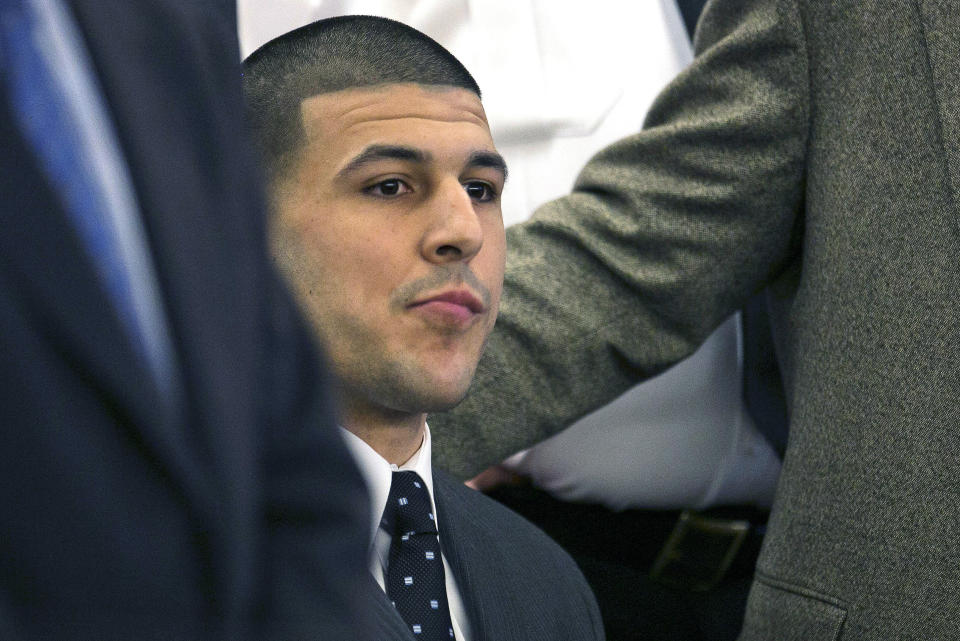That Aaron Hernandez had CTE is devastating news for the NFL
Based on his violent outbursts, mood swings and self-medicating ways, it comes as little surprise that Aaron Hernandez suffered from chronic traumatic encephalopathy (CTE), as his lawyer alleges in a new lawsuit against the NFL and the New England Patriots.
The degenerative brain disease has been most commonly found in football players, soldiers and others who have suffered from repeated concussions.
“Aaron had Stage III CTE usually seen in players with a median age of death of 67 years,” reads a lawsuit attorney, Jose Baez, filed in the name of Hernandez’s daughter, Avielle.
It may explain, yet hardly excuse, Hernandez of murdering Odin Lloyd in 2013 or being charged for the 2012 slaying of Daniel de Abreu and Safiro Furtado. He beat the double murder because while there was no disputing he was in the car the night of the drive-by shooting, prosecutors couldn’t conclusively prove he was the triggerman. It may also provide insight into his prison suicide last spring while serving a life sentence for the Lloyd killing.
Based on his age, however, a CTE diagnosis this significant comes as not just a surprise, but a chilling moment for a sport that is trying everything to both make the game safer and convince young athletes, and their parents, that it is worth playing.
Sixty-seven years old? Advanced stages? That is the opinion of researchers at Boston University, who have been the leaders on CTE research.
Hernandez played just three seasons in the NFL, 44 games total for the Patriots, before being arrested at the age of 23 for the Lloyd murder. He was 27 when he took his life.

There were 40 additional games at the college level, at the University of Florida. And then there is whatever he played at Bristol (Conn.) Central High School, where sources said that despite Hernandez being by far the biggest, strongest player in the state, they believed he suffered multiple concussions.
This isn’t some old lineman from the 1970s. This isn’t a guy who played 16 seasons in the NFL.
This is a young man who first showed signs of outrageous violence when he sucker punched a Gainesville bar manager, rupturing his eardrum, as a freshman with the Gators.
He was 17 at the time.
The double homicide in Boston took place after Hernandez’s second season in the NFL. He was 22.
So maybe he played only 30 games with New England before dealing with unthinkable rage and aggression – prosecutors argued that Hernandez decided to shoot up the victim’s car because de Abreu splashed a drink on him earlier at a nightclub.
Does this stem from the NFL … or college … or high school … or Pop Warner … or …
It’s one case. It’s one player. There are millions of former football players who never became Aaron Hernandez and, indeed, are leading happy, healthy lives. CTE doesn’t automatically turn you into a murderer, nor does the diagnosis offer a defense for Hernandez’s actions.
Still, in terms of public relations, this is a devastating case for the sport of football. Not merely the NFL, but already youth leagues and high schools dealing with decreased participation.
Until his father’s death at age 16, Hernandez grew up in a two-parent home in Bristol, Connecticut, a relatively safe city in an extremely safe state. He wasn’t in a gang growing up. He had no criminal record. He lived in a house with a white fence, a basketball hoop on the garage and a yard his parents made he and his brother mow in the summer and rake in the fall.

The “why” has always been the question for Hernandez.
Why did a kid so many remember being polite and well adjusted in high school become involved in guns and violence and at least one middle-of-the-night murder? Why did he choose that life when he seemingly had everything – stardom with the Pats, a $40 million contract and a beautiful young daughter with his fiancée he’d been dating on and off since middle school.
Now Baez, who in court painted Hernandez as innocent and harmless, is claiming him as a victim of football. The concussions did it. The CTE led him to take his life. We’ll see what kind of traction he gets there.
Boston University has made its conclusion, and Baez, on behalf of Avielle Hernandez, has filed suit. It stands to reason that with the CTE diagnosis, the families of Lloyd, de Abreu and Furtado will follow with wrongful death suits of their own against the NFL, the Patriots and perhaps the University of Florida, as well.
Aaron Hernandez, who arrived in Gainesville at 17 and the NFL at 21, the youngest player in the league, a guy who suited up in just 84 college and professional games, had the brain of a 67-year-old man when he hanged himself at the end of a prison bed sheet.
Maybe the why has finally been answered with Hernandez; the questions for the game of football are just beginning, though.
More from Yahoo Sports:
• Jeff Passan: There’s no excuse for MLB’s negligence on netting
• Former NFL star Ricky Williams arrested in Texas
• Players ask Goodell to back racial equality campaign
• Ex-MLB star gets prison in $200M corruption scandal
